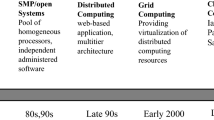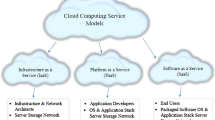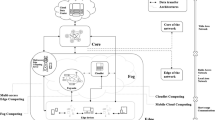Abstract
The performance of mobile devices including smart phones and laptops is steadily rising as prices plummet sharply. So, mobile devices are changing from being a mere interface for requesting services to becoming computing resources for providing and sharing services due to immeasurably improved performance.
With the increasing number of mobile device users, the utilization rate of SNS (Social Networking Service) is also soaring. Applying SNS to the existing computing environment enables members of social network to share computing services without further authentication.
To use mobile device as a computing resource, temporary network disconnection caused by user mobility and various HW/SW faults causing service disruption should be considered. Also these issues must be resolved to support mobile users and to provide user requirements for services.
Accordingly, we propose fault tolerance and QoS (Quality of Services) scheduling using CAN (Content Addressable Network) in Mobile Social Cloud Computing (MSCC). MSCC is a computing environment that integrates social network-based cloud computing and mobile devices. In the computing environment, a mobile user can, through mobile devices, become a member of a social network through real world relationships. Essentially, members of a social network share cloud service or data with other members without further authentication by using their mobile device. We use CAN as the underlying MSCC to logically manage the locations of mobile devices. Fault tolerance and QoS scheduling consists of four sub-scheduling algorithms: malicious-user filtering, cloud service delivery, QoS provisioning, and replication and load-balancing. Under the proposed scheduling, a mobile device is used as a resource for providing cloud services, faults caused from user mobility or other reasons are tolerated and user requirements for QoS are considered.
We simulate scheduling both with and without CAN. The simulation results show that our proposed scheduling algorithm enhances cloud service execution time, finish time and reliability and reduces the cloud service error rate.
















Similar content being viewed by others
References
Peter, M., Timothy, G.: The NIST definition of cloud computing. National Institute of Science and Technology, Special Publication 800-145 (2011)
http://en.wikipedia.org/wiki/Social_network. Accessed 20 August 2012
http://www.ust-global.com/blog/cloud-mobile-social-paradigm.aspx. Accessed 20 August 2012
http://www.wired.com/insights/2012/05/social-mobil_e-cloud/. Accessed 20 August 2012
Jing, D., Scott, H., Yunghsiang, H., Julia, D.: Fault-tolerant and reliable computation in cloud computing. In: Globecom Workshops, pp. 1601–1605 (2010)
Jie, L., Marty, H., You-Wei, C., Youngryel, R.: Fault Tolerance and Scaling in e-Science Cloud Applications: Observations from the Continuing Development of MODISAzure. e-Science 246–253 (2010). doi:10.1109/eScience.2010.47
Yilei, Z., Zibin, Z., Michael, L.: BFTCloud: A Byzantine Fault Tolerance Framework for Voluntary-Resource Cloud Computing. Cloud Computing 444–451 (2011). doi:10.1109/CLOUD.2011.16
Yi, H., Bin, G., Fengyu, W.: Cloud model-based security-aware and fault-tolerant job scheduling for computing grid. ChinaGrid, 25–30 (2010)
Hyunjoo, K., Sooyong, K., Heon, Y.: Server selection schemes considering node status for a fault-tolerant streaming service on a peer-to-peer network. J. Inf. Process. Syst. 2(1), 6–12 (2006)
Qian, T., Huiyou, C., Yang, Y., Chunqin, G.: A trustworthy management approach for cloud services QoS data. In: ICMLC, pp. 1626–1631 (2010)
Habib, S.M., Ries, S., Muhlhauser, M.: Cloud computing landscape and research challenges regarding trust and reputation. In: UIC/ATC, pp. 412–415 (2010)
Meng, X., Lizhen, C., Haiyang, W., Yanbing, B.: A multiple QoS constrained scheduling strategy of multiple workflows for cloud computing. In: ISPA, pp. 629–634 (2009)
Peng, Z., Zheng, Y.: A QoS-aware system for mobile cloud computing. In: CCIS, pp. 518–522 (2011)
Yanchao, Z., Yuguang, F.: A fine-grained reputation system for reliable service selection in peer-to-peer networks. IEEE Trans. Parallel Distrib. Syst. 18(8), 1134–1145 (2007)
Juan, T., Daniel, H., Florin, I., Jes’us, C.: Predictive data grouping and placement for cloud-based elastic server infrastructures. In: CCGrid, pp. 285–294 (2011)
Kyle, C., Simon, C., Omer, R., Kris, B.: Social cloud computing: a vision for socially motivated resource sharing. Serv. Comput. 5(4), 551–563 (2011)
Ryan, W., Roger, K., Frank, S., Yan, B., Meeta, S.: Design and implementation of a secure healthcare social cloud system. In: CCGrid, pp. 805–810 (2012)
Sylvia, R., Paul, F., Mark, H., Richard, K., Scott, S.: A scalable content-addressable network. In: SIGCOMM, pp. 161–172 (2001)
Alexandru, P., David, E., Markus, F., Demetres, K.: Routing in content addressable networks: algorithms and performance. In: IEEE ITC Specialist Seminar (2009)
Mohammed, A., Egemen, T., Rui, Z., Lars, K.: Load Balancing for Moving Object Management in a P2P Network. In: DASFAA. LNCS, vol. 4947, pp. 251–266. Springer, Berlin (2008)
Sahin, O.D., Gupta, A., Agrawal, D., Abbadi, A.: A peer-to-peer framework for caching range queries. In: ICDE, pp. 165–176 (2004)
Amir, B., Anang, H., Muhamad, A., Asad, K.: Under the cloud: a novel content addressable data framework for cloud parallelization to create and virtualize new breeds of cloud applications. In: NCA, pp. 168–173 (2010)
Shidong, Z., Bai, W., Gengyu, W., Chao, X.: Web QoS management model based on CAN. In: ISCID, pp. 143–146 (2011)
Anuchart, T., Guang, G.: A framework toward a self-organizing and self-healing certificate authority group in a content addressable network. In: WiMob, pp. 614–621 (2010)
Henry, R., Daniel, V., Djamshid, T.: Enhancements to CAN for the application as distributed data storage system in grids. In: BroadNets, pp. 432–438 (2005)
Roger, Z., Wei-Shinn, K., Haojun, W.: Spatial data query support in peer-to-peer systems. In: COMPSAC, pp. 82–85 (2004)
Rodrigo, N.C., Rajiv, R., Anton, B., De Rose, C.A.F., Buyya, R.: CloudSim: a toolkit for modeling and simulation of cloud computing environments and evaluation of resource provisioning algorithms. SPE J. 41(1), 23–50. ISSN:0038-0644 (2011)
Author information
Authors and Affiliations
Corresponding author
Additional information
This work was supported by the National Research Foundation of Korea (NRF) grant funded by the Korea government (MEST) (No. 2012R1A2A2A02046684).
Rights and permissions
About this article
Cite this article
Choi, S., Chung, K. & Yu, H. Fault tolerance and QoS scheduling using CAN in mobile social cloud computing. Cluster Comput 17, 911–926 (2014). https://doi.org/10.1007/s10586-013-0286-3
Received:
Accepted:
Published:
Issue Date:
DOI: https://doi.org/10.1007/s10586-013-0286-3




